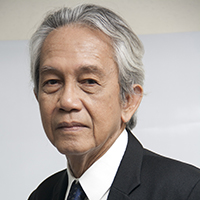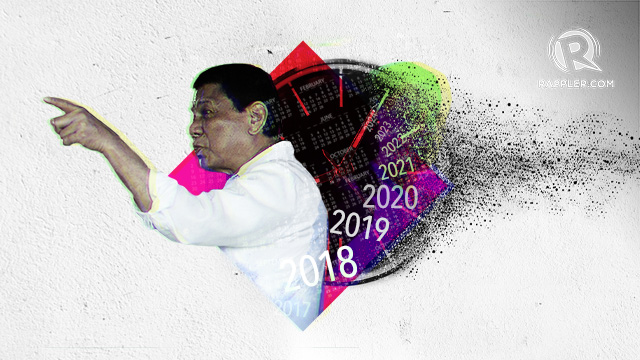
Duterte is the only president who has everyone, including his supporters, asking how much longer he’s going to be around. I understand why. Duterte is so unstable, so unpredictable, he’s doing so much damage that people hope he will be gone soon. I would love to be proven wrong, but it is likely he will tread water until 2022.
Duterte’s signature campaign, his drug war, is drawing more and more opposition. The Integrated Bar of the Philippines, a 50,000-strong lawyers organization recently signed an agreement with the Commission on Human Rights to provide free legal assistance to victims of the government’s drug war. The Solicitor General is being raked over the coals in the Supreme Court.
Duterte himself is the main enemy of his drug war. I’m not sure what organ his mouth is connected to, for sure not his brain. During the election campaign, he said he would solve the drug problem in 3-6 months. Then he asked for a year because he did not realize so many policemen were into drugs. Later he said it’s impossible to solve the problem within his term. Now it’s back to one year.
Implementation is disorganized because Duterte can’t make up his mind. When public opposition spiked because of the murders of several teenagers, he transferred the campaign to the Philippine Drug Enforcement Agency (PDEA). Then he fired Dangerous Drugs Board (DDB) chief Dionisio Santiago because he was offended by Santiago’s criticism of his drugs policy. Then he moved leadership in the drug campaign back to the PNP. Back in February 2017, the same thing happened.
His other major initiative, the peace process, is also a mess. The MILF process is moving forward mainly because the MILF is playing a careful and determined game. The BBL, an Aquino administration initiative, could get approved by Congress next year. Talks with the National Democratic Front (NDF) is at a standstill, with Duterte declaring the Communist Party of the Philippines-NDF-New People's Army (CPP-NDF-NPA) terrorist organizations, ordering the arrest of bailed CPP leaders, issuing shoot-to-kill orders. No more talks, he’s had enough of the CPP, Duterte says.
But wait. After more than two weeks of steady attacks, Duterte now says this was just a “cooling off” period after intense “disagreements". The CPP, for its part, has signaled willingness to continue, even declaring a Christmas unilateral ceasefire. The talks will probably resume, but Duterte himself is open about having to clear everything with the military.
Duterte seems to think that going from one extreme to another on policy options has no effect on implementation. How can you follow a leader if you can’t believe what he says because he might change his mind tomorrow or next week? How can you take initiative in your work when you might offend Duterte and get fired?
Yet another administration initiative, the impeachment of Chief Justice Maria Lourdes Sereno is looking more and more forced, the longer the hearings in the House justice committee continue. The committee’s decision that complainant Larry Gadon had “personal knowledge” to justify the approval of the complaint as being sufficient in “form and substance” is looking more and more ridiculous the longer Gadon faces questions by committee members.
Some committee members have pointed out that it is the justice committee that is doing the work of Gadon. Even if the House leadership forces a plenary vote that sends the complaint to the Senate, House prosecution lawyers will have a hard time defending the impeachment complaint. Unlike in the House where Sereno lawyers were not allowed to cross examine witnesses, this cannot be done in an impeachment trial. It is unlikely that they will get enough votes to convict.

Polarization
The Duterte administration’s frustration with its inability to have its way is driving it to attack its imagined enemies more and more. Other than the SC chief justice, the Ombudsman is also being targeted for impeachment. More and more cases are being filed against Aquino administration people. They are actually doing a favor to the Liberal Party because easy identification of critics as “Yellowtards” is driving more and more people to the party.
There are no organized “destabilization” plots that I know of. But the administration is so unsure of itself that it sees “destabilization” behind every criticism. It’s not the Liberal Party, or the Church hierarchy, or the Ombudsman, or the Commission on Human Rights which stand in the way of Duterte’s plans. If I were him, I would worry that his strongest critics – Senators Leila de Lima and Risa Hontiveros, Chief Justice Maria Lourdes Sereno, Omsbudsman Conchita Carpio-Morales, Vice President Leni Robredo – are all women.
To avoid these critics, to get rid of these obstacles, Duterte and his people have two projects: federalism/charter change and “revolutionary government”. Speaker Pantaleon Alvarez and Senate President Koko Pimentel have reportedly agreed to convene the two houses of Congress into a constituent assembly as early as January 2018. The PDP has submitted a set of proposed amendments which are supposed to guide the process.
Paradoxically, the proposals for shifting from a unitary to a federal form of government, the core of the Duterte and Pimentel advocacy for years, is unclear. What is laid out in detail is a proposal for a presidential/parliamentary form of government. The president would retain a lot of power – Duterte’s French model? The Senate becomes a weak second house. The center of gravity will be a powerful “federal assembly”.
Presumably to secure the support of the existing House of Representatives, all single member districts, and political clan-controlled party-list groups will be retained, the latter through a system of proportional representation at the regional level. The Prime Minister and a majority of cabinet ministers will be members, all the easier then to negotiate pork barrel. And no Senate to compete with.
Since this proposal is unlikely to get the required three-fourths vote in the Senate, they will try to get the Supreme Court to rule that the House and Senate should vote in joint session. Thus the need to impeach CJ Sereno. If this fails, then “revolutionary government”! Duterte will abolish Congress and the Supreme Court, all pesky media, and rule by decree. With one minor condition, he will need the military to enable him to rule as dictator, Marcos-style.
In a pointed political message, the Secretary of National Defense and the AFP chief-of-staff said they are opposed to a “revolutionary government”. More pointed still, they said it in a press conference together with Vice President Leni Robredo. By the time Duterte and his people had organized nationwide demonstrations in support of a “revolutionary government”, Duterte himself had already been forced to retreat and say he does not really support the idea.
Four-and-a-half more years of Duterte is an interminable, insufferable length of time. His regime is wreaking havoc on many political institutions, especially the weakest of our 3 branches of government, the judicial system. The legal contortions that the solicitor general and the justice secretary are going through to keep Senator De Lima in jail is making it hard for law schools. How do you teach law when the top law officers of the regime do not respect it?
The circus in the House justice committee on the Sereno impeachment is undermining the Supreme Court. I am not a lawyer, but I have not heard anything that sounds like “culpable violation of the Constitution”. What is happening is that petty jealousies among justices and disagreements on administrative matters are being dragged before the public eye, taking away the majesty and power that secret deliberations enforce.
Filipinos are used to terrible political conditions. It takes a long time (14 years of Marcos!) and a lot of converging events before we say “Tama Na, Sobra Na” (Enough Already). The analyst in me says “get used to four-and-a-half more years”. But can you blame me for wishful thinking? – Rappler.com
Joel Rocamora is a political analyst and a seasoned civil society leader. An activist-scholar, he finished his PhD in Politics, Asian Studies, and International Relations in Cornell University, and had been the head of the Institute for Popular Democracy, the Transnational Institute, the Akbayan Citizens’ Action Party, and member to a number of non-governmental organizations. From the parliament of the streets, he crossed over to the government and joined Aquino's Cabinet as the Lead Convenor of the National Anti-Poverty Commission.